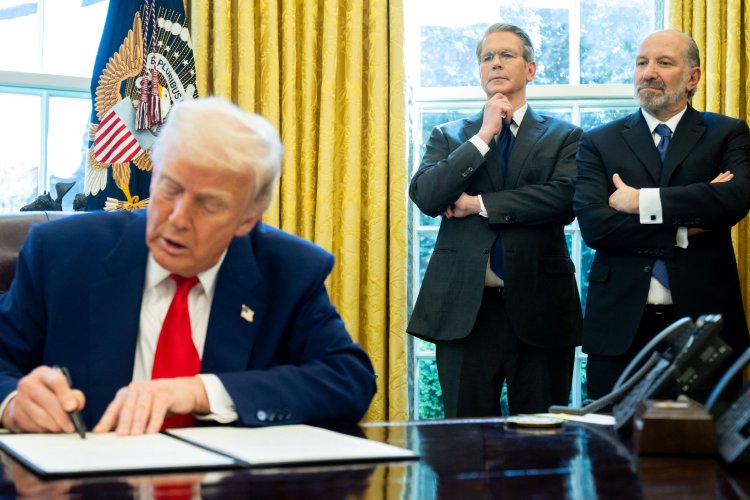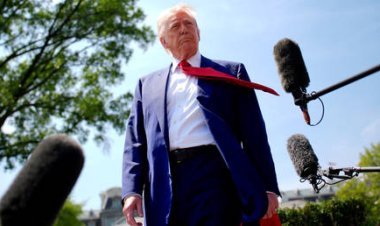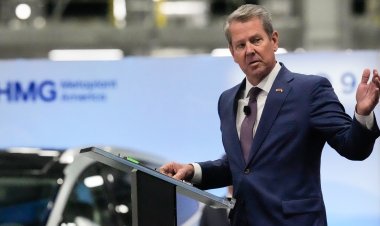'A former Trump official on what’s next for China: ‘Essentially, trade stops’
President Donald Trump intensified a critical trade conflict with Beijing. A former trade official expresses concern that he might be going too far.

Trade expert Nazak Nikakhtar has expressed her concerns regarding this escalation, discussing the implications for businesses and the administration on the PMG Tech podcast.
A former Commerce Department official during Trump's initial term and currently the head of the national security practice at the law firm Wiley, Nikakhtar highlights the vulnerabilities faced by the tech industry in light of potential retaliatory measures from Beijing, as well as the necessity of the high tariffs despite the economic repercussions.
Below is an edited excerpt of her conversation. For the complete interview, tune into PMG Tech on platforms like Apple, Spotify, or Audible.
Can you kind of wrap your head around how dramatically this has escalated?
A month ago, two months ago, people in the United States [and] around the world would have thought it was unfathomable to get to tariff rates that high with China. Because over my almost 25 years dealing with trade with China specifically, once you get into high double digits, essentially trade stops. China will just pull back and really focus on other markets. And so this really is forcing a decoupling.
It's our high tariff rates, China's counter-tariff rates, and China's export restrictions to the United States. And the reason the export restrictions are pretty severe is that China knows exactly where to hit to have maximum impact. And where they decided to focus their export restrictions are really the nuts and bolts that our manufacturing sector needs, and the manufacturing sector supports the economy. So in a nutshell, it's getting pretty ugly.
There are obviously tech companies like Apple and Nvidia that make a lot of products in China or sell them there. How hard could those companies be hit, do you think?
The Chinese government is going to threaten them unless they use their influence on the U.S. government to walk the U.S. government back, or it's just going to go after them directly so that those companies are going to have no choice but to advocate to the U.S. government. ‘Look, I'm going to lose all this revenue and I'm going to collapse if I'm not allowed to do business there.’
And, you know, to be honest with you, the government has now heard this narrative so much. It's almost, almost becoming immune to it. … The U.S. government can only be sympathetic for so long. And frankly, I think the Trump administration is kind of expecting businesses, like you've had eight years to understand that I'm not going to protect your financial interests by not going after China to protect our national security interests.
The president took tariffs off a bunch of countries because he said they've shown an eagerness to come to the negotiating table. Is it possible for China to still get that treatment?
The president is going to be very open [to] negotiating with China, even though the president and, frankly, all of the U.S. government leaders have been burned by China. China has just really never adhered to any of its deals. I think the president still wants to figure out how to get a deal with China where China is going to comply.
I don't think China wants a deal. President Xi Jinping is a different person than he was in 2018. I think he's consolidated power. He's indigenized high-tech capabilities, including semiconductors, AI, etc. He’s almost at the end of his unprecedented third term, looking for a fourth. … He pretty much knows something we don't know, which is they don't really need the American economy as much as we think that they do.
As you look ahead, do you think Donald Trump or Xi Jinping is in the more comfortable position here?
I don't know who's in a more comfortable position. Xi Jinping has the facts to maybe be in a more comfortable position. I mean, we just saw the stock market, right? A little bit of pain and the economy goes berserk. So I think a little bit of the disconnect is that the president, I think, thinks that he has a little bit more cards than he does. He has some. But I think he's overestimating the hand that he has. The American economy just is not willing to withstand even a day of pain.
Now, does China have some weaknesses, too? It's the rest of the world slowly potentially starting to turn their back on China. But I don't think Xi Jinping cares. Trump is going to care a little bit more than Xi Jinping does and really does want a deal. But he's going to want to deal on his terms and he’s going to want a deal from his position of power, and Xi Jinping is not going to give it to him.
Subscribe to PMG Tech on Apple, Spotify, Audible, or your preferred podcast player.
Debra A Smith for TROIB News
Find more stories on Business, Economy and Finance in TROIB business












